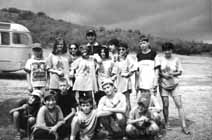A vaccination from prejudicesLubov Vishnevskaya
Only in Soviet films ideological enemies became friends in a split second. It is far more difficult in life. But if there is a slight opportunity to begin a peaceful dialog, it must be used… That student from MSU became a speaker of the Parliament of Abkhazia long ago. The present students of Tatiana Diakova from the summer camp, which is held for the second year by the Center of peacemaking and social development together with Daghestan ecological biological center of students, are much younger. But some of them, though they are only twelve years old, already have an experience of living in tent camps of Ingushetia, and the others became orphans. Former hostages of adult "games", now they are participants of a camp session with a symbolical slogan "Friendship without boaders". As it often happens one people act as terminators- destroyers, the others try to lay a bridge of confidence and respect between peoples. Gulinara Ahmetova, a teacher of Daghestan State university, is a regional representative of the Center, one of the camp co-ordinators. Young woman tries to avoid stresses on the past of her wards: "Just common children. Yes, there are orphans among them, but there are also those who are considered "to be to living in clover". We don't practice special selection of children. We take everybody". About 200 young citizens of Kabardino-Balkaria and Ingushetia, Chechnya and Karachaevo-Cherkessia, Daghestan and Nothern Ossetia visited this camp near Izberbash for the last two years. Muscovites were also supposed to come. But parents were afraid to let the children go: the last year military operations on the territory of Daghestan were still fresh in their minds. Gulinara and her colleagues would like that children, who were born in the period of the collapse of Soviet empire, regarded children of other nationalities as friends and didn't consider them enemies they should beware of. The representatives of neighboring nations should know more about the cultures of each other! The girl says that only last summer she noticed that in Daghestan and in Chechnya lezghinka is danced in different ways. At the camp evening party, devoted to acquaintance with the traditions and customs of the North Caucasia peoples, she made sure that in the first case young boys and girls dance in couples, while in the second case they almost dance solo. And a boy from Kabardino-Balkaria almost didn't use arms in his dance…
The knowledge, which children receive at the world culture lessons, are specially adapted to the pupils' age. Children can know about the role of communication in our world with the help of a game "spoilt telephone". A sketch with a clothes-line tell children about malignancy of prejudices and necessity of inter-respect and empathy in human relations. At the request of Tatiana Diakova children surround a swarthy black-haired boy and start to stick labels on him according to his nationality: "You have never respected the other nationalities", "You are very wicked and artful", "You dream of attacking us", "What did you come here for?". With each phrase the teenager's body is entwined with a clothes-line. It seems that accusations will never end. But the clothes-line ends. And than "the tormentors" ask what their "victim" feels. Then they begin to unwind the clothes-line cocoon, in turn pronouncing words full of respect to the representative of the given nationality. You would ask, should we focus the children attention on the problem of intolerance? We should, because it is at least unreasonable to close our eyes to the prejudices, existing in our society. Especially in time of aggravation of international problems. Improvising a conflict situation, children learn to feel compassion and to be tolerant. You have but agree that these features of character are very important. The theory is supported with training of skills of communication and ability to solve mini-conflicts, which existed even in the camp. During one of the "lessons", when a group was proposed to work out a joint decision, the group literally "harassed" a boy from Daghestan for his proposal. Here is the story… Children divided into couples and began to think out how they could spend virtual money, allotted by the camp director. Should they buy their leader a souvenir? Or buy sweets for everybody? Or photo albums? Having made a decision in a couple, the children united in teams of four, than of eight people. The conflict broke out at the meeting of the whole group, when somebody suggested to make a present to inmates of Nalchik Children's Home. No, it won't do, decided the majority of children; there were only three children from this Children's Home. The others are in other groups. The sum was not enough for everybody, so it would be better to spend it on ice-cream. A discouraged teacher had to organize a group "candle party" (frank, serious intimate talk; all the group children take part in it) and to appeal to the hearts of pragmatic teenagers for a long time. The next day they proposed Tatiana Diakova to change their hasty decision and give the money to the orphans. It is very difficult to teach the growing generation to collaborate, hear and listen to the interlocutor. After returning home the members of the camp session don't forget each other: they phone each other, write letters. The Center officials made them a New Year present: they sent copies of an amateur film, made in summer, to all the republics. The film evoked a new wave of letters. A letter from "Bart", a tent camp for refuges from Chechnya, situated in Ingushetia, stuck in Gulnara's memory. Its author complained of boredom and said that visiting psychologist's tent was the only pleasure for the children who visited Kaspiy. Children assemble their friends of the same age and tell them about the ecological peacemaking camp. Maybe, they remember about a picture-panorama, created by them, devoted to the camp of the future, where their children and grand-children will meet. What will it be like? I hope, it will be as happy as this Daghestan one. With blue sea, yellow sand, funny two-storey wooden houses with so squeaky staircases. That is why you always know when guests are coming… Once the words of a woman, who became an incidental witness of my misfortune, helped me a lot: "Everything will be all right. Think of the future". Banal words, which strengthened my faith in good. I would like to hope that a water-colour world of the future, painted by children, gave them a confidence in tomorrow. |
 Having received an invitation to work in ecological peacemaking camp for children from the North Caucasia region, Tatiana Diakova agreed without hesitation. Former English teacher, assistant of the Moscow Duma deputy, she had an experience of work in non-governmental organization "Independent service of the world". In 1994 she became one of the organizers of international conference aimed at non-violent solving of conflicts. At that time young leaders from the hot spots of the world came to Gaaga. Tatiana still cannot forget hostility between a boy from Abkhazia and a girl of the same age, member of parliament from Georgia. MSU's (Moscow State University) student, almost graduate historian, this boy from Abkhazia came home for holidays and found himself in the epicentre of ethnic conflict. Because of an explosion he was wounded and had his both legs amputated. You may imagine what he felt during the conference. At that moment the girl was an enemy for him, through whose fault the country was destroyed, his friends died and he became an invalid!
Having received an invitation to work in ecological peacemaking camp for children from the North Caucasia region, Tatiana Diakova agreed without hesitation. Former English teacher, assistant of the Moscow Duma deputy, she had an experience of work in non-governmental organization "Independent service of the world". In 1994 she became one of the organizers of international conference aimed at non-violent solving of conflicts. At that time young leaders from the hot spots of the world came to Gaaga. Tatiana still cannot forget hostility between a boy from Abkhazia and a girl of the same age, member of parliament from Georgia. MSU's (Moscow State University) student, almost graduate historian, this boy from Abkhazia came home for holidays and found himself in the epicentre of ethnic conflict. Because of an explosion he was wounded and had his both legs amputated. You may imagine what he felt during the conference. At that moment the girl was an enemy for him, through whose fault the country was destroyed, his friends died and he became an invalid!
 This camp doesn't look as a common camp. First of all, because it's financing is not provided by the state. Two years ago the camp was financed by UNO Children Fund (UNICEF). Last year it was financed by the Swiss embassy in the Russian Federation. Secondly, its leaders and teachers are volunteers. Thirdly, its participants not only rest there, but study as well. In addition to traditional bathing, excursions and discos its organizers decided to fill a gap in the knowledge of their wards and introduced zoology, biology and flora lessons. That is why the story about the consequences of chemical pollution of the water and soil were followed by the acquaintance with plants, put down in The Red Book. And after a competition of natural fantasies, when girls in costumes of fir cones and seaweed walked on extemporaneous podium, an ecological performance was staged. Children performance of a bird or a tree, which an unwise Man is trying to destroy, is more effective, than any lecture about damage, caused by thoughtless attitude to the nature. You will ask, why did the camp organizers combine an idea of peacemaking with an ecological education? Because wars and ecological disasters are closely connected.
This camp doesn't look as a common camp. First of all, because it's financing is not provided by the state. Two years ago the camp was financed by UNO Children Fund (UNICEF). Last year it was financed by the Swiss embassy in the Russian Federation. Secondly, its leaders and teachers are volunteers. Thirdly, its participants not only rest there, but study as well. In addition to traditional bathing, excursions and discos its organizers decided to fill a gap in the knowledge of their wards and introduced zoology, biology and flora lessons. That is why the story about the consequences of chemical pollution of the water and soil were followed by the acquaintance with plants, put down in The Red Book. And after a competition of natural fantasies, when girls in costumes of fir cones and seaweed walked on extemporaneous podium, an ecological performance was staged. Children performance of a bird or a tree, which an unwise Man is trying to destroy, is more effective, than any lecture about damage, caused by thoughtless attitude to the nature. You will ask, why did the camp organizers combine an idea of peacemaking with an ecological education? Because wars and ecological disasters are closely connected.